JoJo's Bizarre Adventure, Golden Wind, Season 4, Episode 39: Sleeping Slaves
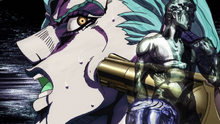 Episode 39 basically deals with the rest of the Sleeping Slaves arc, picking up right where we left off. And... and it's kind of a shame that the Sleeping Slaves/Rolling Stones stuff does feel pretty much introdumped to us in the elevator scene. With a significant amount of the scenes being Mista's angry Bad Cop routine and Scolippi himself initially being framed as an unreliable narrator, it does make the exposition feel a bit questionable.
Episode 39 basically deals with the rest of the Sleeping Slaves arc, picking up right where we left off. And... and it's kind of a shame that the Sleeping Slaves/Rolling Stones stuff does feel pretty much introdumped to us in the elevator scene. With a significant amount of the scenes being Mista's angry Bad Cop routine and Scolippi himself initially being framed as an unreliable narrator, it does make the exposition feel a bit questionable. But Rolling Stones is basically a future-predicting Stand, one that works automatically, regardless of what Scolippi wants. It's following Bucciarati at the moment, and while the episode doesn't actually straight-up say it, it basically represents fate. We get Scolippi talking about how the Renaissance era sculptor Michelangelo says that he doesn't have any thoughts while carving a sculpture, noting that each marble slab already has a statue inside of them. Scolippi equates this to fate and destiny, and how destiny is sculpted similar to how Rolling Stones reveals the 'statue' sculpted by destiny. In this case, Bucciarati's destiny is being killed, shot multiple times and gushing out blood, just like what the statue shows.
And Scolippi further notes that the florist's daughter ended up understanding her fate from Rolling Stones, how both she and her father had a terminal disease, and she ended up choosing to take her own life instead of suffering, and also to preserve her still-healthy organs for when her father needs it. It's... it's a bit convenient, but okay, at least that's that storyline wrapped up.
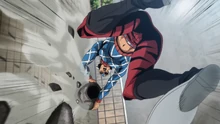 It also illustrates Rolling Stones' other ability, which is the ability to essentially cause those it shows to die without pain. The problem is, of course, Mista definitely isn't ready to allow Bucciarati to die at all, and dismisses everything Scolippi says as crackpot. Up until Scolippi off-handedly remarks that he's not going to die there since his fate wasn't shown in Rolling Stones. Mista's gun jams multiple times when he tries to shoot Scolippi in the head Russian Roulette style, and, of course, turns out that Bucciarati is in the same building that they are in.
It also illustrates Rolling Stones' other ability, which is the ability to essentially cause those it shows to die without pain. The problem is, of course, Mista definitely isn't ready to allow Bucciarati to die at all, and dismisses everything Scolippi says as crackpot. Up until Scolippi off-handedly remarks that he's not going to die there since his fate wasn't shown in Rolling Stones. Mista's gun jams multiple times when he tries to shoot Scolippi in the head Russian Roulette style, and, of course, turns out that Bucciarati is in the same building that they are in. Throughout the sequence, Scolippi keeps telling Mista that everything is going to be a lot easier if they don't defy the rock and accept their fate. And we get a brief action sequence as the rock passes through walls and floors, even following Bucciarati through Sticky Fingers, and it's Mista jumping out of the building, grabbing the rock, and smashing it against the pavement to apparently destroy it. We get a neat little nod to the earlier mentions of a tape recorder, because Mista was saved by Fugo driving back to the apartment building to hand Mista the tape recorder he forgot to bring.
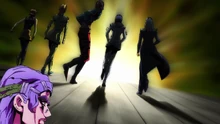 And at least Rolling Stones is apparently destroyed, but the incident basically changed fate, causing Bucciarati to investigate Leaky-Eyed Luca's death himself (which, of course, led to his encounter with Giorno, the biggest change in their fate), while Mista is debriefed on whatever the fuck's going on by Fugo.
And at least Rolling Stones is apparently destroyed, but the incident basically changed fate, causing Bucciarati to investigate Leaky-Eyed Luca's death himself (which, of course, led to his encounter with Giorno, the biggest change in their fate), while Mista is debriefed on whatever the fuck's going on by Fugo. Scolippi, meanwhile, observes that by attacking Rolling Stones and attempting to change fate, they've defied fate, and now the faces in the stone include Narancia and Abbacchio. And, of course, we know the two of them would die over the course of Part V. Scolippi basically reflects that they've changed their fate, and there is some meaning to these men's insane struggle to try and change fate. And that, I think, is a nice, succinct nod to the themes in Vento Aureo. Whether it was specific scenes in specific encounters (Mista vs. Ghiaccio; Zombie Bucciarati; Trish vs. BIG; Abbacchio's last stand, etc), or general character growth, the members of Bucciarati's cell have all clawed and fought against fate, and while it did lead to them dying, they fought and changed fate the hard way. It's a costly fight, for sure, but it's definitely better than the alternative. They are "sleeping slaves to fate" that will find meaning only when they wake up.
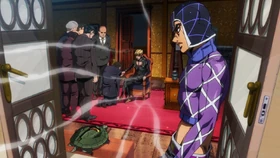 And... it's a powerful message for sure, and it's something that you can definitely see being explored here and there in Vento Aureo. Between the struggles of Team Bucciarati, and the fact that their ultimate enemy is Diavolo, a man who can skip through struggles and just look at results; as well as Gold Experience Requiem's destiny-and-fate-altering abilities, a lot of the themes could be seen as being hammered home by the Sleeping Slaves arc. I just really wished that, as far as the present-day story goes, we got a bit more, y'know? And I kinda wished that this is the sort of thing we'd get from the anime adaptation, especially seeing how we got a slightly extended ending for Part IV showing Morioh coming back to peace.
And... it's a powerful message for sure, and it's something that you can definitely see being explored here and there in Vento Aureo. Between the struggles of Team Bucciarati, and the fact that their ultimate enemy is Diavolo, a man who can skip through struggles and just look at results; as well as Gold Experience Requiem's destiny-and-fate-altering abilities, a lot of the themes could be seen as being hammered home by the Sleeping Slaves arc. I just really wished that, as far as the present-day story goes, we got a bit more, y'know? And I kinda wished that this is the sort of thing we'd get from the anime adaptation, especially seeing how we got a slightly extended ending for Part IV showing Morioh coming back to peace. But Part V's final shot is definitely a strong one. They regroup with Polnareff, we get an explanation of the ghost/turtle situation, Trish and Mista are buddies now, Giorno has the arrowhead and gives a speech about how it's the duty of the survivors to keep moving forward... and we get a time-skip, where Giorno, in all black, is the Don, the Boss, while Mista and turtle Polnareff loom over their new Don.
And thus... Parte 5 Fine.
And it definitely could've been a better ending. Maybe we could've gotten more out of Giorno's character other than speeches. Maybe we get something more definitive for Diavolo, something a bit more extended. An extra epilogue dealing with Trish or Fugo. There definitely are a couple of oddities in Part V we didn't really cover -- Diavolo's specific origin; any connection with the Part III-IV cast (Giorno being Dio's son really didn't matter, huh)... but all in all, Part V has definitely been a very fun and flavourful Part of JoJo. I'm not sure if it's going to count as my favourite part, but right now it definitely feels a lot stronger than the previous four.
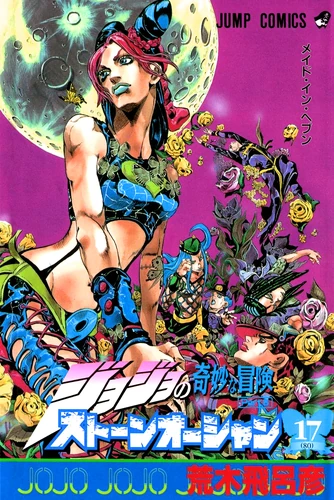 What is next for the JoJo anime I'm still not sure -- are we going to get an adaptation of Purple Haze Feedback and use it to cap off the Italian arc? I don't see that happening, honestly, since the light novels are kind of ambiguously-canon, as much as I do love the conclusion to Fugo's story in Purple Haze Feedback. So I guess we're going headlong into Stone Ocean in a year or two... which I'm definitely looking forward to see what my reaction will be. I've always felt like Part VI was one of the weaker JoJo parts, but I'm not sure, again, if that's because of the poor quality of translations when I first read these comics the first time around, or if, like the other JoJo parts, it's just something that's going to be enhanced when viewed with colours, action and a whole lot of hammy voice-acting. We'll see!
What is next for the JoJo anime I'm still not sure -- are we going to get an adaptation of Purple Haze Feedback and use it to cap off the Italian arc? I don't see that happening, honestly, since the light novels are kind of ambiguously-canon, as much as I do love the conclusion to Fugo's story in Purple Haze Feedback. So I guess we're going headlong into Stone Ocean in a year or two... which I'm definitely looking forward to see what my reaction will be. I've always felt like Part VI was one of the weaker JoJo parts, but I'm not sure, again, if that's because of the poor quality of translations when I first read these comics the first time around, or if, like the other JoJo parts, it's just something that's going to be enhanced when viewed with colours, action and a whole lot of hammy voice-acting. We'll see!
I think the symbolism can be interpreted in various ways. Personally, I saw a different meaning to this arc. (long comment incoming)
ReplyDeleteScolippi admits that nobody can change fate. Bruno is going to die in pain from a big hole in his chest, and that's what fate has in store for him. But his stand, Rolling Stones, represents one's "acceptance" of what is to come. That is, the easy way out. It's simpler, for sure, and might even look more rewarding - the florist's daughter not only died painlessly, but her organs were used to save her father's life. That seems much better than dying in pain, doesn't it?
Bruno and Mista, after being presented with the cold hard facts, could have chosen to let the stone do its job. But even then, nobody among Bruno's group wants shortcuts (well, except maybe Fugo, and perhaps Mista didn't understand the situation - after all, you can't change your fate by destroying a stone anymore than you can kill someone by tearing up a photo of them). Instead, they fight. And by fighting, Bruno eventually meets his fate - he dies at Diavolo's hands. But then he lasts a little longer, and that is Diavolo's downfall. That too is fate. Was it Giorno's life power that made him go past his own death? Possibly, but it couldn't have happened if he hadn't met his fate. Gold Experience Requiem being able to change fate? Arguably that is fate too (Pucci believes as much during Part 6).
If Bruno had taken the easy way out, none of this would have happened. Instead, only by choosing to fight, seemingly against fate itself, he may fulfill what had been prepared for him all along.
That is why Scolippi calls them "sleeping slaves who will find a meaningful purpose when they awaken" - they are slaves of fate (we all are) who have been chosen for some grand design, and even though they had an easy way out, they have been chosen exactly because they have the resolve to see their destiny through the end. By choosing to fight, these sleeping slaves have awakened and may now bring fate's plans to completion.
If so, that would be a different message - it would mean you shouldn't change your fate after all. But it's still quite inspirational, because while one can be destined to great things, even so "only those who believe in their own path will eventually shine". Just because you have a destiny for greatness, it doesn't mean you don't have to fight for it. Because if at any point you stop fighting and take the easy shortcut, it's over. You'll never meet with greatness.
Well, in the end, I think Araki left it open to interpretation on purpose. Different people can see different meanings in it.
(on a side note: Stone Ocean is definitely a bit weak, but I sure hope we'll get to Steel Ball Run eventually)
That is definitely another great read of the Rolling Stones arc, actually -- the 'easy way' out would be for Bruno to keep his head down and not cause as much of a ruckus as he would eventually did when Giorno showed up and changed all of Bruno's plans in regards of what he would do to for Passione. If Bruno hadn't gone through with Giorno's plan, he probably would've been a great Capo in his side of Italy, and definitely still be alive. Or maybe he would die thanks to the effects of Roling Stones. Either way.
DeleteBut, well... y'know, they ended up fighting fate, and the end of the story is definitely one that ended up being a lot better than what it would've been. Even the sacrifices along the way (Abbacchio's being the most poignant with the vision he had in the afterlife) ended up building up to something huge as they ended up bringing down Diavolo and bringing about a brighter tomorrow than they ever thought would be possible. I absolutely do like your reading that they are 'sleeping' until they decide to fight fate itself... and honestly, there's a whole lot of ways to interpret these last couple of chapters/episodes for Vento Aureo. The fact that the writer doesn't lay out things as barely as the previous parts actually adds to just how 'deep' this chapter ends up feeling, and definitely fits with the whole vibe of Vento Aureo as a whole. Either way you slice it, either "fight fate if you don't want to accept the death it has in store for you" or "only by fighting could you obtain the destiny fate has in store for you", the message is ultimately boiled down to "fight for what you think is right".
And, honestly, I really don't think Giorno, Bruno and the others all really cared what fate is 'supposed' to be. Is fate supposed to be the destiny that Rolling Stones spelled out for them? Did fate take the intervention of Rolling Stones into question? Does it really matter? Whatever the case, the Bucciarati gang fought tooth and nail for it, reaching the end goal that they desired, and whether that was what fate had in store for them in the first place, or if they broke the wheel of fate, they achieved greatness thanks to their grit and efforts.
I always felt like Stone Ocean had a lot of great moments and characters, but it was burdened by an ending that felt lackluster, a segment where it's just Araki trying to think up of the weirdest powers he has thanks to the escalatingly more complex Stands we've been having since Part 3, and a significantly less consistent vibe compared to Part 3 through 5. The fact that Part 6 tended to have a less successful time juggling callbacks to previous series and its own story also kind of hurt it a fair bit.
Steel Ball Run is awesome, though, and definitely is up for competition for being my favourite part.